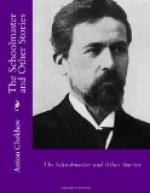And all present at the dinner began as one man talking of Sysoev’s extraordinary talent. And as though a dam had been burst, there followed a flood of sincere, enthusiastic words such as men do not utter when they are restrained by prudent and cautious sobriety. Sysoev’s speech and his intolerable temper and the horrid, spiteful expression on his face were all forgotten. Everyone talked freely, even the shy and silent new teachers, poverty-stricken, down-trodden youths who never spoke to the inspector without addressing him as “your honour.” It was clear that in his own circle Sysoev was a person of consequence.
Having been accustomed to success and praise for the fourteen years that he had been schoolmaster, he listened with indifference to the noisy enthusiasm of his admirers.
It was Bruni who drank in the praise instead of the schoolmaster. The German caught every word, beamed, clapped his hands, and flushed modestly as though the praise referred not to the schoolmaster but to him.
“Bravo! bravo!” he shouted. “That’s true! You have grasped my meaning! . . . Excellent! . . .” He looked into the schoolmaster’s eyes as though he wanted to share his bliss with him. At last he could restrain himself no longer; he leapt up, and, overpowering all the other voices with his shrill little tenor, shouted:
“Gentlemen! Allow me to speak! Sh-h! To all you say I can make only one reply: the management of the factory will not be forgetful of what it owes to Fyodor Lukitch! . . .”
All were silent. Sysoev raised his eyes to the German’s rosy face.
“We know how to appreciate it,” Bruni went on, dropping his voice. “In response to your words I ought to tell you that . . . Fyodor Lukitch’s family will be provided for and that a sum of money was placed in the bank a month ago for that object.”
Sysoev looked enquiringly at the German, at his colleagues, as though unable to understand why his family should be provided for and not he himself. And at once on all the faces, in all the motionless eyes bent upon him, he read not the sympathy, not the commiseration which he could not endure, but something else, something soft, tender, but at the same time intensely sinister, like a terrible truth, something which in one instant turned him cold all over and filled his soul with unutterable despair. With a pale, distorted face he suddenly jumped up and clutched at his head. For a quarter of a minute he stood like that, stared with horror at a fixed point before him as though he saw the swiftly coming death of which Bruni was speaking, then sat down and burst into tears.
“Come, come! . . . What is it?” he heard agitated voices saying. “Water! drink a little water!”
A short time passed and the schoolmaster grew calmer, but the party did not recover their previous liveliness. The dinner ended in gloomy silence, and much earlier than on previous occasions.




